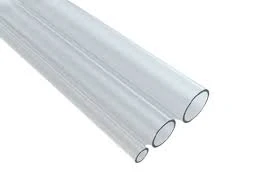Urr . 11, 2024 14:51 Back to list
Choosing the Right PVC Drain Pipe for Your Plumbing Needs
The Comprehensive Guide to PVC Drain Pipes
When it comes to plumbing, drainage plays a crucial role in maintaining the hygiene and safety of any residential or commercial space. Among various materials available for drainage systems, PVC (Polyvinyl Chloride) drain pipes have become increasingly popular due to their numerous advantages. This article delves into the benefits, applications, installation processes, and considerations related to PVC drain pipes.
What are PVC Drain Pipes?
PVC drain pipes are specifically designed for drainage applications. Made from a durable plastic polymer, PVC pipes are known for their lightweight, corrosion-resistant, and economical properties. These pipes come in various sizes and thicknesses to suit different drainage needs, making them ideal for both residential and commercial plumbing systems.
Advantages of PVC Drain Pipes
1. Durability One of the most significant benefits of PVC drain pipes is their long lifespan. These pipes do not rust or corrode like metal pipes, ensuring that they can withstand harsh environmental conditions without deteriorating over time.
2. Cost-Effectiveness PVC pipes are generally more affordable than metal alternatives. Their lightweight nature also reduces transportation costs, making them a cost-effective choice for large-scale plumbing projects.
3. Ease of Installation Unlike traditional piping materials, such as cast iron or clay, PVC pipes are easy to handle and install. Their lightweight design allows for quicker and less labor-intensive installations, making them an attractive option for contractors and DIY enthusiasts alike.
4. Smooth Interior Surface The internal smoothness of PVC pipes minimizes friction, promoting efficient water flow and reducing the likelihood of clogs. This feature is particularly important in drainage applications, where blockages can lead to costly repairs and maintenance.
5. Corrosion Resistance PVC pipes are impervious to many chemicals and do not corrode over time like their metal counterparts. This quality makes them suitable for various applications, including industrial settings where exposure to corrosive substances may occur.
Applications of PVC Drain Pipes
PVC drain pipes find extensive applications across different sectors, including
pvc drain pipe

- Residential Plumbing PVC pipes are commonly used in household drainage systems, such as waste pipes, vent pipes, and sewer lines, due to their reliability and efficiency.
- Commercial Projects Many commercial buildings utilize PVC drain pipes for their plumbing needs, including restaurants, offices, and warehouses, where reliable drainage systems are essential.
- Agricultural Uses PVC pipe systems are often employed in agricultural settings for irrigation and drainage purposes, facilitating efficient water management in farms and greenhouses.
- Stormwater Management PVC pipes are also widely used in stormwater drainage systems, helping to channel rainwater away from roads and properties to prevent flooding and erosion.
Installation Considerations
While PVC drain pipes offer many benefits, proper installation is critical to ensure optimal performance. Here are a few tips
1. Sizing Choose the appropriate size of PVC pipes based on the specific drainage requirements. Using pipes that are too small can lead to clogs, while oversized pipes can lead to ineffective drainage.
2. Cutting and Joining PVC pipes can be easily cut to size using a saw, but it’s crucial to make clean cuts for secure fittings. Joining methods typically involve solvent cement, which creates a strong bond when applied correctly.
3. Slope Ensure that the drainage pipes are installed at a proper slope (generally 1% to 2%), allowing gravity to assist in flow. An insufficient slope can lead to stagnant water and eventual clogs.
4. Protection from UV Rays PVC pipes can degrade when exposed to sunlight for prolonged periods. If outdoor installation is necessary, consider using protective coatings or covering the pipes to minimize UV exposure.
Conclusion
In summary, PVC drain pipes stand out as a versatile, durable, and cost-effective solution for drainage applications in various sectors. Their ease of installation and resistance to corrosion make them a preferred choice among plumbers and contractors. Whether for residential, commercial, or agricultural use, understanding the advantages, applications, and installation considerations of PVC drainage systems can help ensure a well-functioning plumbing infrastructure. By making informed decisions about materials, you can enhance the longevity and efficiency of your drainage systems, contributing to a safer and cleaner environment.
-
PVC Transparent Sheet Roll - Durable & Flexible PVC Plastic Sheet Roll for Industrial & Home Use
NewsJun.24,2025
-
High-Quality PVC PPR Pipes and Fittings Durable ERA PPR Solutions
NewsJun.10,2025
-
High-Quality Large HDPE Sheets & Large Diameter PVC Pipe Durable Large PVC Pipe Supplier
NewsJun.10,2025
-
High Density Polyethylene Cutting Board - Durable & Food Safe
NewsJun.09,2025
-
3 Inch PVC Pipe for Durable Irrigation Affordable & Reliable
NewsJun.09,2025
-
Premium PPR Plastic Water Pipe Fittings - Durable & Leak-Free
NewsJun.09,2025

